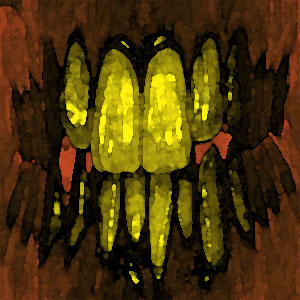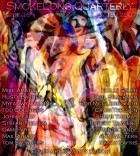“This” has that indeterminacy of a “someone” or “something.” What role do you see “this” playing in this piece?
It’s funny, when I was writing this piece, I kept thinking about an episode of Cribs as done by a literary character versus, you know, Mariah Carey or 50 Cent, and what of importance a character might want the world to see. So in many ways “this” is simply the angle of the camera as it flashes around a person living inside of heartbreak, the things he points out and remembers the equivalent of 25 bottles of Crystal in the fridge to Snoop. On a higher-less-shows-I-watch-on-MTV-when-I’m-not-writing level, “this” is also about the narrator’s inability to look at anything, including himself, directly. He is surrounded by things, their meaning long since muted by the end of the relationship.
House. Front door. Kitchen. Family Room. Hallway. Office. Bedroom. Wedding Ring. Lock. Sliding Glass Door. Closet. What You Left Behind. What I Kept. Me. Discuss, if you would, this progression.
Well, I’ll be honest: If I had more than 1000 words, there would have been more (this is officially the shortest story I’ve ever written and perhaps because of that, one of the more difficult). And maybe, at some later point, there will be more, as I’ve found myself returning to this story and thinking about other aspects of this character’s life that might be explicated. The choices I made here, however, were intentional. I wanted to go from the broadest point to the narrowest, moving from what the outside world might see to what lives inside the narrator. In my mind, this is actually the house I grew up in Walnut Creek, CA and because of that these rooms are filled with an interesting and troubling series of memories for me that I wanted to replicate some through this story, about how certain rooms have the quality of different emotions. I remember thinking, as a child, that from the outside this house seemed so quiet, so peaceful, so how could it possibly be filled with so much anger and sadness? And when I see photos today of the family room or the hallway—invariably, my sister will email me one she’s just scanned with something like “remember how this spot smelled just like Sam’s piss?” as the email subject line—it both makes me laugh and makes me feel a little nauseated. A place can be haunted even if it doesn’t have any ghosts in it.
“Sometimes I was just a passive observer-not unlike the actual me as it relates to the particular experience.” Terrific and compelling. This line feels vital. Is it? And if so, what’s revealed through it?
I hope it is. This is largely a story of passivity, about the inability to come to grips with what is true, or with what has become fact even if the narrator doesn’t find it be true. Memory is such that when we think about particularly traumatic experiences we are given the opportunity to edit how we acted and what we thought about, adjusting the facts to suit our own truths. In the case of this scene and this narrator, it’s not merely passivity that has caused his relationship to end, it’s the narrator’s inability to see what role he played.
Tell us all you can about Simplify—and what’s next for you and your writing.
173 pages. 59,000 words. 12 stories. Simplify was the first book published by OV Books, the book publishing arm of the excellent literary journal Other Voices and was the realization of my first dream as a writer, which was to publish a collection of stories. I couldn’t have asked for a better experience, which is a testament to how much Gina Frangello and the rest of the Other Voices team feel about the books they are publishing, how much sweat equity they are willing to put in to get their books into the hands of people who will read them and appreciate them. After spending the last few years working on novels exclusively, it felt great to go back and polish the older stories (I hadn’t read the first story I ever published, “Love Somebody,” since sometime around 1998, so going back and looking at it again and adding new stuff, cutting out other stuff. and just sort of refamiliarizing myself with the writer I was then was fun in sort of a personal anthropology kind of way) and writing two new stories (“Rise, John Wayne, And Rebuke Them” and “Myths of our Time”) really re-energized me for short fiction. So, with that in mind, my next book is going to be another collection, which I’m hoping to be finished with in the next month or so.
At the recent AWP conference, a number of writers talked about their old flames, books that have influenced them during a formative time in their lives-and ones they return to for lessons in writing and, of course, life. Discuss your old flame, both what it meant to you then and what it means to you now.
Rock Springs by Richard Ford isn’t an old flame as much as it is part of an approved three-some as my wife long ago agreed that it could live with us and would share all emotional and physical rights provided therein. A college professor (and a fine writer in his own right) of mine named Jack Lopez handed me a copy of Rock Springs in 1992 and it changed me as both a reader and as a writer. Then, it showed me how to create convincing stories about people walking on a knife’s edge that didn’t require any actual knives, only people and conflict and consequence. Now, it’s a reminder that the best stories are still the ones that make you question the motives of people, both good and bad, and that man is never able to walk away from consequences of his deeds. I still have the same, ratty old copy of Rock Springs Jack Lopez gave me and it’s never too far from my reach.



 The core workshop of SmokeLong Fitness is all in writing, so you can take part from anywhere at anytime. We are excited about creating a supportive, consistent and structured environment for flash writers to work on their craft in a community. We are thrilled and proud to say that our workshop participants have won, placed, or been listed in every major flash competition. Community works.
The core workshop of SmokeLong Fitness is all in writing, so you can take part from anywhere at anytime. We are excited about creating a supportive, consistent and structured environment for flash writers to work on their craft in a community. We are thrilled and proud to say that our workshop participants have won, placed, or been listed in every major flash competition. Community works.